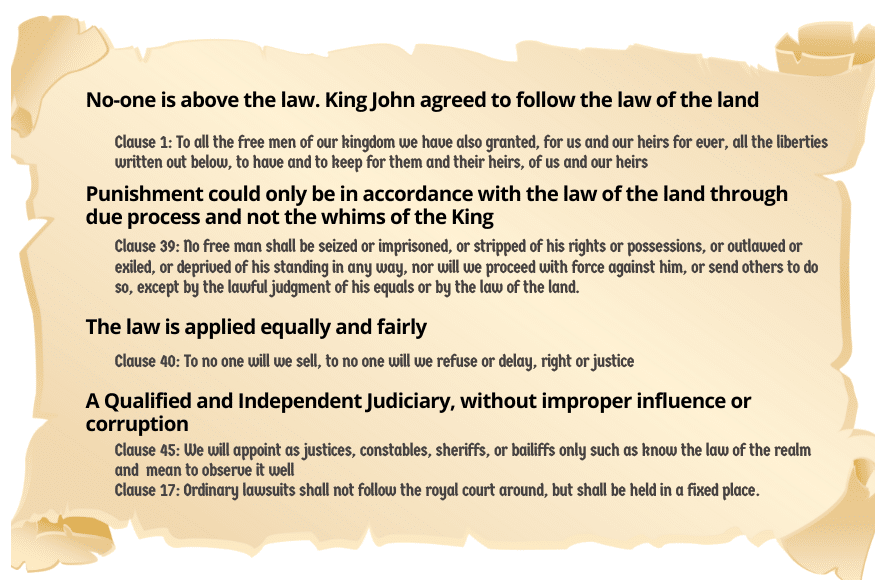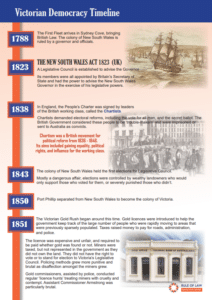Secret Ballot
How the Eureka Stockade shaped the development of the Secret Ballot and democracy in Australia.
This resource focuses on the introduction of the Secret Ballot as triggered by the Eureka Rebellion.
Shortly after the Eureka Rebellion, Victoria was the first colony in Australia to adopt Secret Voting in 1856.
Britain adopted the Australian ballot system in 1878, and the United States followed in 1888. The Australian System is now used in many countries around the world today.
Eureka: Victorian Democracy Timeline
This timeline reflects the important democratic developments that took place in Victoria during the time of the Eureka Stockade.
The Eureka Rebellion contributed to the introduction of the Secret Ballot in Victoria as:
1. The Gold Rush brought many immigrants from around the world, bringing their ‘new ideas’ to the growing colony. Many of these immigrants had ties with the Chartist Movement, which outlined its claims in the ‘People’s Charter’ signed in England in 1838. One of the aims of the Chartist Movement was to adopt Secret Voting.
2. The Ballarat Reform League met in the month before the Eureka Stockade and demanded many of the rights outlined in the Chartist’s Peoples Charter.
3. When those involved in the Eureka Stockade later became Members of Parliament, they incorporated many of the aims outlined in the People’s Charter within the new laws passed, such as secret voting (Secret Voting was included in the Electoral Act 1856 (Vic).
The Importance of a Secret Ballot at the time of the Eureka Rebellion
The introduction of the secret ballot was, and continues to be, a beacon of democracy in Australia and is foundational to the integrity of the rule of law.
Open Voting and why Secret Voting was Important
Before the Secret Ballot, voting occurred in public and the state of voting was known throughout the election day, leading to the manipulation of remaining voters from many politically active individuals . Concurrently, voters were often pressured to vote in a particular way by their employers or landlords (House-to-House Canvassing). Finally, the traditional, British-colonial method of voting was rowdy (as voters were given alcohol to encourage them to vote a certain way) and left individuals vulnerable to intimidation or duress.
Secret Voting further aided those who could not read and write as the names were already written on the sheet provided to the voter, and the returning officer read the finalised document back to the individual to ensure all was in order. Thus, access to justice was established through this policy.
Ultimately, the emotionally charged atmosphere of these voting events created the potential for corruption and created an environment where the rights and freedoms of the people could be oppressed by those in power.
The significance of secret voting for those at Eureka
In their struggle for rights and liberties, the Ballarat miners understood that for a civilisation to flourish it must have a government that is run by the people and for the people. In the Ballarat Reform League Charter this was outlined as ‘the inalienable right of every citizen to have a voice in making the laws he is called upon to obey.‘
Having a representative government, free from the pressures of wealthy employers and landowners reversed the notion that people needed to be parented or controlled. It extinguished any presence of intimidation and coercion upon the voting system and provided each voter their own voice to express who they wanted to elect to represent them.
To provide a check on those in power and ensure the people could vote in accords with their own conscience and preference, a secret ballot was critical.
Principles of the Chartist Movement and Ballarat Reform League
Chartist Movement and the Magna Carta
Many of the ideals in the People’s Charter can be traced back to the Magna Carta sealed by King John of England in 1215. The Magna Carta established the rule of law and the idea that all citizens, including those in power, should be fairly and equally ruled by the law. It began the tradition of respecting the law, limiting government power, providing access to justice and the protection of human rights. Some of the clauses in the Magna Carta include:

The Ballarat Reform League Charter starts:
“At a Meeting held on Bakery Hill in the presence of about ten thousand men on Saturday November 11th, 1854 the following were adopted as the principles and objects of the “Ballarat Reform League”
That it is the inalienable right of every citizen to have a voice in making the laws he is called upon to obey – that taxation without representation is tyranny.”
This first principle closes echoes one of the best known principles of the Magna Carta; that there should be no taxation without the consent of the people.
Legislative Changes following Eureka
Following the Eureka Rebellion, new laws were introduced that helped the development of democracy. In particular:
- The Miner’s Right Act 1855 (Vic)
- The Goldsfield Law Act 1855 (Vic)
- The Victorian Constitution Act 1855 (UK), and
- The Electoral Act 1856 VIC
These statutes enabled representatives to be elected from the goldfields and provided, for a very small fee annual fee of one pound, the ability for all miners to vote.
With these changes, Peter Lalor and John Humffray were elected into the Legislative Council on behalf of the people in Ballarat.
In 1856, one of the first aims of the People’s Charter, Secret Voting, was adopted in Victoria through the Electoral Act (1856)
Secret Voting in Australia today
The Australian Constitution
The Australian Constitution provides the express right to vote in section 41.
As Australia does not have a Bill of Rights, there is no separate list of rights such as the right to a secret ballot. Instead, section 323 of the Commonwealth Electoral Act 1918 requires officers and scrutineers to maintain secrecy. They are charged not to, “divulge or communicate any information with respect to the vote of an elector” that they may have acquired in the function of their duties, which in essence provides Australians the ability to vote in secret.
Each State also has their own Acts to provide Secret Ballots for State elections.
International Covenant on Civil and Political Rights (ICCPR) and Secret Ballots
Article 25
Every citizen shall have the right and the opportunity, without any of the distinctions mentioned in article 2 and without unreasonable restrictions:
(a) To take part in the conduct of public affairs, directly or through freely chosen representatives;
(b) To vote and to be elected at genuine periodic elections which shall be by universal and equal suffrage and shall be held by secret ballot, guaranteeing the free expression of the will of the electors;
(c) To have access, on general terms of equality, to public service in his country.
Article 25 of the ICCPR identifies the secret ballot as a right that all citizens are entitled to. However, although Australia has signed and ratified the ICCPR, it has never been incorporated into domestic law and thus, Australia is not officially bound in law by the articles

